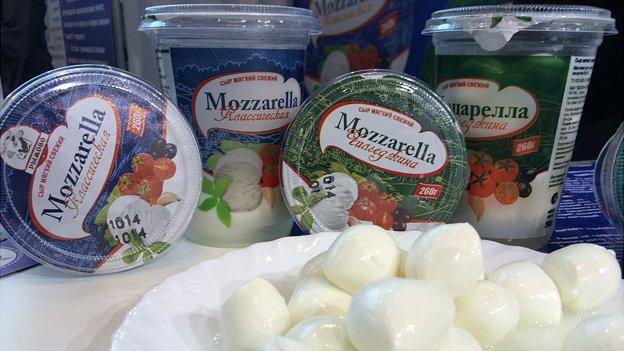Russia in grim go-it-alone mood as sanctions bite
- Published
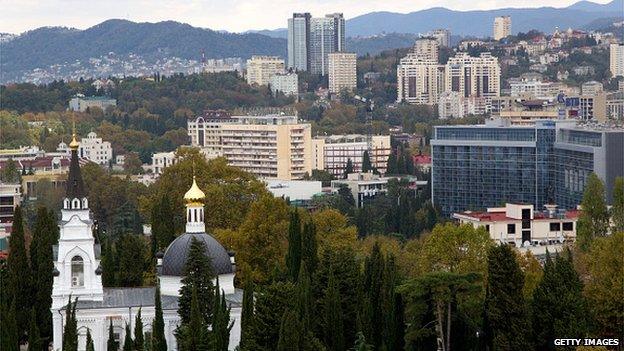
Sochi was given a lavish makeover for the Winter Olympics
Russia's efforts to reduce its reliance on trade with the West overshadowed a high-profile meeting between President Vladimir Putin and foreign correspondents in Sochi.
The annual "Valdai Club" meeting took place at the Black Sea resort which hosted this year's Winter Olympics. It was also meant to be the venue for a G8 summit this year - but that was cancelled because of the Ukraine crisis and sanctions against Russia.
"I'm not sorry the G8 didn't happen," one senior Russian official told us, not entirely convincingly. "In any case, now we have this asset to use in the best interests of Russia."
Appearances can be deceptive, though. The architectural legacy of this most expensive of Winter Games may look like an Olympic white elephant.
But in fact, we were told, most hotels are already fully booked for the upcoming winter ski season. Forget Switzerland. A New Year party in Sochi is, it seems, the latest hot ticket for the loyal elite of Mr Putin's new Russia.
For it is not foreign visitors whom the Russian government is relying upon to recoup the astronomical costs of the Olympic extravaganza, but patriots with money who need to demonstrate their allegiance to the Kremlin.
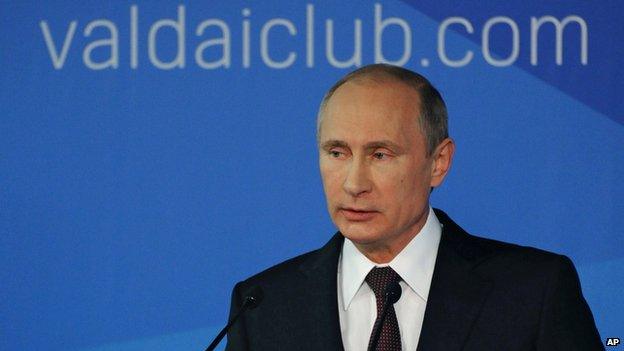
Mr Putin lashed out at US foreign policy in his speech in Sochi
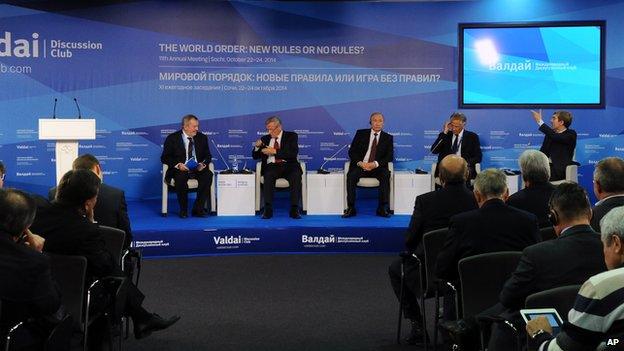
The forum was used by the Kremlin to blame the West for the Ukraine crisis
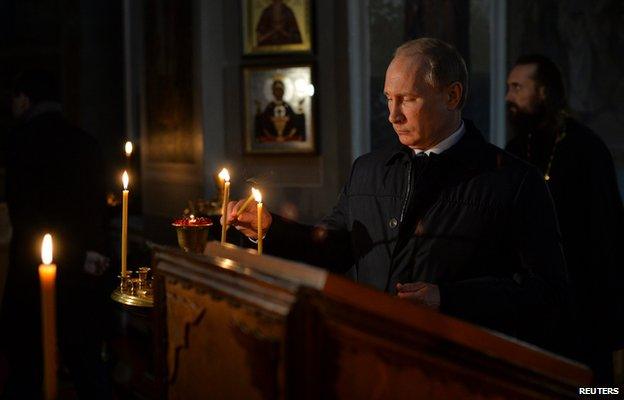
Mr Putin's Orthodox faith helps to promote a patriotic stance defiant of Western values
It makes Sochi a good metaphor for one of President Putin's favourite themes at the moment: that Russia should not rely on outsiders any more - the only way it will grow stronger is by reducing its exposure to outside influence and drawing on its own resources to solve problems.
New restrictions
Thus, months before the Ukraine crisis, Russian officials with a taste for foreign luxury were being told to close foreign bank accounts, repatriate assets, and bring their families back to Russia.
No wonder Russian officials shrugged at US and EU blacklists. They are already under instructions not to travel.
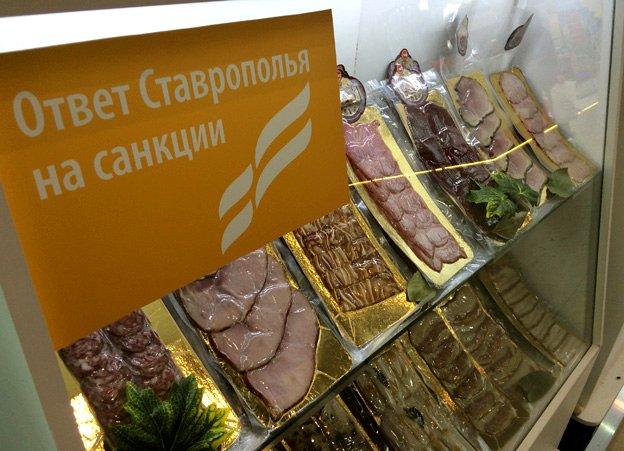
A sticker at an agricultural fair in Moscow says: "Stavropol's answer to sanctions"
No wonder the Russian government imposed a ban on food imports from EU countries. Patriotic Russians these days are supposed to spurn continental cheese and yoghurt, to support their own dairy industry.
A series of senior Russian officials who came to talk to us in our mountain eyrie tried hard to argue that Western sanctions - far from being a blow - were really an opportunity.
Yes, they admitted, there had been some pain, especially in Russia's financial sector (foreign currency loans which are increasingly hard to service, billions lost in capital flight, plunging rates for the rouble), and especially with a budget squeezed by almost zero growth and falling oil prices.
But from the president down, the litany was the same: sanctions will only make Russia more determined and more resilient.
'Crimea is closed'
"The topic of Crimea is closed," said one official. "You in the West may not accept it for a hundred years. But we are patient. Our dispute with Japan over the Kurile Islands has continued for decades. Crimea is a closed subject."
Russia annexed Ukraine's Crimea peninsula in March, triggering Western sanctions, which have become tougher since then.
"Whenever problems come from abroad, it unites the Russian people around their leader," said another official.
And if the Americans thought sanctions would isolate Russia, they were wrong, argued Mr Putin. Russia would simply turn to China and other Asian partners. Plus, reluctant Europeans eager to restart trade with Russia would surely soon come to their senses.
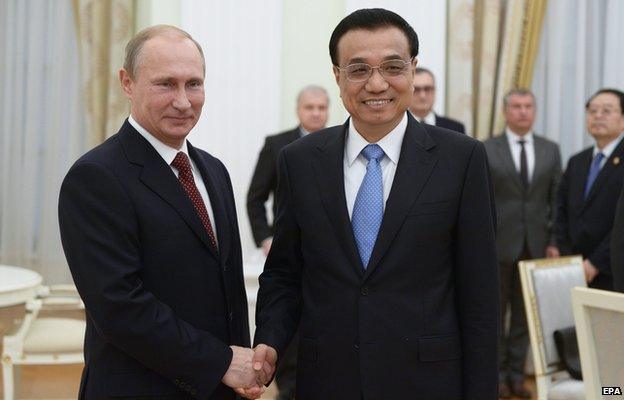
This year Russia and China signed a historic 30-year gas deal worth $400bn (£248bn)
"The worst thing that could happen to Russia right now is for sanctions to be lifted quickly," was the astonishing claim of one top figure, an economist who used to advocate Russian integration with the rest of the world.
Now he says: "We are no longer looking for foreign investment."
He said he was studying how China had turned to its advantage the sanctions imposed after the 1989 Tiananmen Square crackdown, so that it exploded onto the world with double-digit growth less than two decades later. And how Russia had made its comeback after defaulting on its debts in 1998.
Several officials insisted to us that the inner circle around Mr Putin was utterly united. But their nervous protestations suggested the opposite.
Anaemic economy
We also heard that a battle was under way over what to do about Russia's worrying economic situation.
One idea, apparently, is to open up Russia's beleaguered small business sector, to try to stimulate the economy from below.
That sounds unlikely to work, given that a recent report concluded that less than 4% of Russia's small businesses survive longer than three years, so burdened are they by bureaucracy and corruption.
Another competing plan - which sounds equally unrealistic - is apparently to seek to drive modernisation from above, through mega infrastructure projects financed by the state. They are to be carried out, Soviet-style, on a wave of national fervour and enthusiasm.
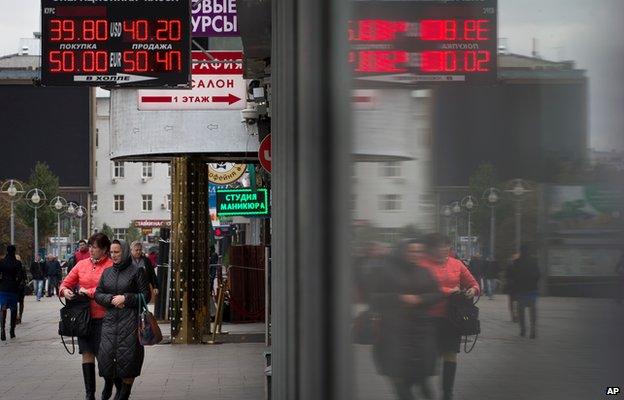
The rouble has tumbled, reflecting the impact of international sanctions and wilting foreign investment
"Russia has made its choice," Mr Putin told us, "To make the economy better we will consolidate society around patriotism and traditional values."
There are also, it seems, fierce debates at the top about whether Russia should try to repair its relations with Europe (though not with the United States), or focus instead on Asian ties to develop the Far East and Siberia.
One official hotly resisted a thesis he said was being aired in top circles that Russia was not part of Europe and could turn its back on it.
"Total gibberish," he said. "I will not let that happen. A common space from Lisbon to Vladivostok is still of benefit to all. Russia will always be part of Europe."
But perhaps what was most extraordinary was the revelation from one top reformer that he had started studying accounts of earlier Communist attempts at economic modernisation, starting with the failed Kosygin reforms of the early 1960s.
When asked why he was looking at the now defunct Soviet system, instead of more contemporary global experience, he replied that it was Russia's own past that was most useful to understand how to go forward.
Soviet echoes
It was a potent reminder of a broader trend emerging in Putin's Russia, where official doctrine seems not only to be turning inward, but to be looking backward, particularly to the Soviet era.
Alongside the drama of the Ukrainian crisis, new steps are being enacted apparently designed to make Russia a more closed society. New laws have made it more difficult for charities to receive foreign funding.
Russians with dual citizenship have had to register their foreign passports. The internet, once a relatively open space in Russia, is now increasingly subject to control and regulation.
Education syllabuses focus more on Russian history and Russian culture. Any criticism of the president could lead to charges of treason on grounds of national security.
"An attack on Putin is an attack on Russia. Without Putin, there is no Russia," one Kremlin official told us.
The remark caused a flurry when it was subsequently leaked to the Russian media, with its implication that Mr Putin is now president for life, and the current regime could extend for decades.
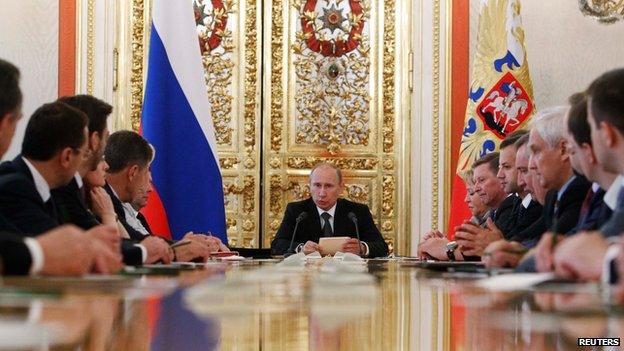
Mr Putin appears often on TV surrounded by the trappings of Kremlin power
One Valdai questioner tried to challenge Mr Putin on this, asking why he felt it made Russia safer to turn in on itself and become less open and democratic.
Mr Putin turned the blame instead on the Americans.
"We do not want to close the door to anyone. It's your leaders saying 'we will punish Russia' who is the problem. But they won't succeed in isolating us," he said, leaving the question unanswered.
Meanwhile, in quiet conversations at meals, a range of Russians expressed their unease about where all this might be heading. Some feared a return to the Soviet days of restrictions on foreign travel.
One or two said they were not planning to stay in Russia. Others said it would be difficult to leave, and anyway they did not want to give up on their country.
But across the board, most seemed to agree that Russia could be entering a grim, dark period.
- Published24 October 2014
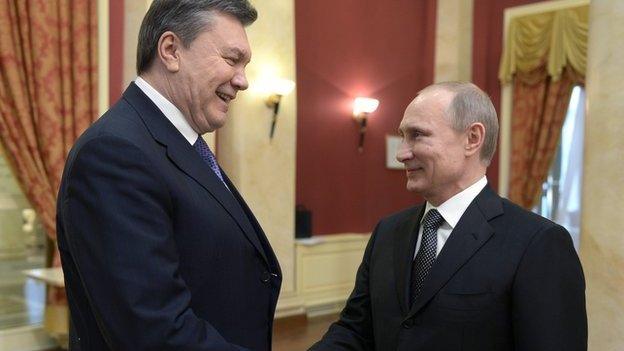
- Published20 October 2014
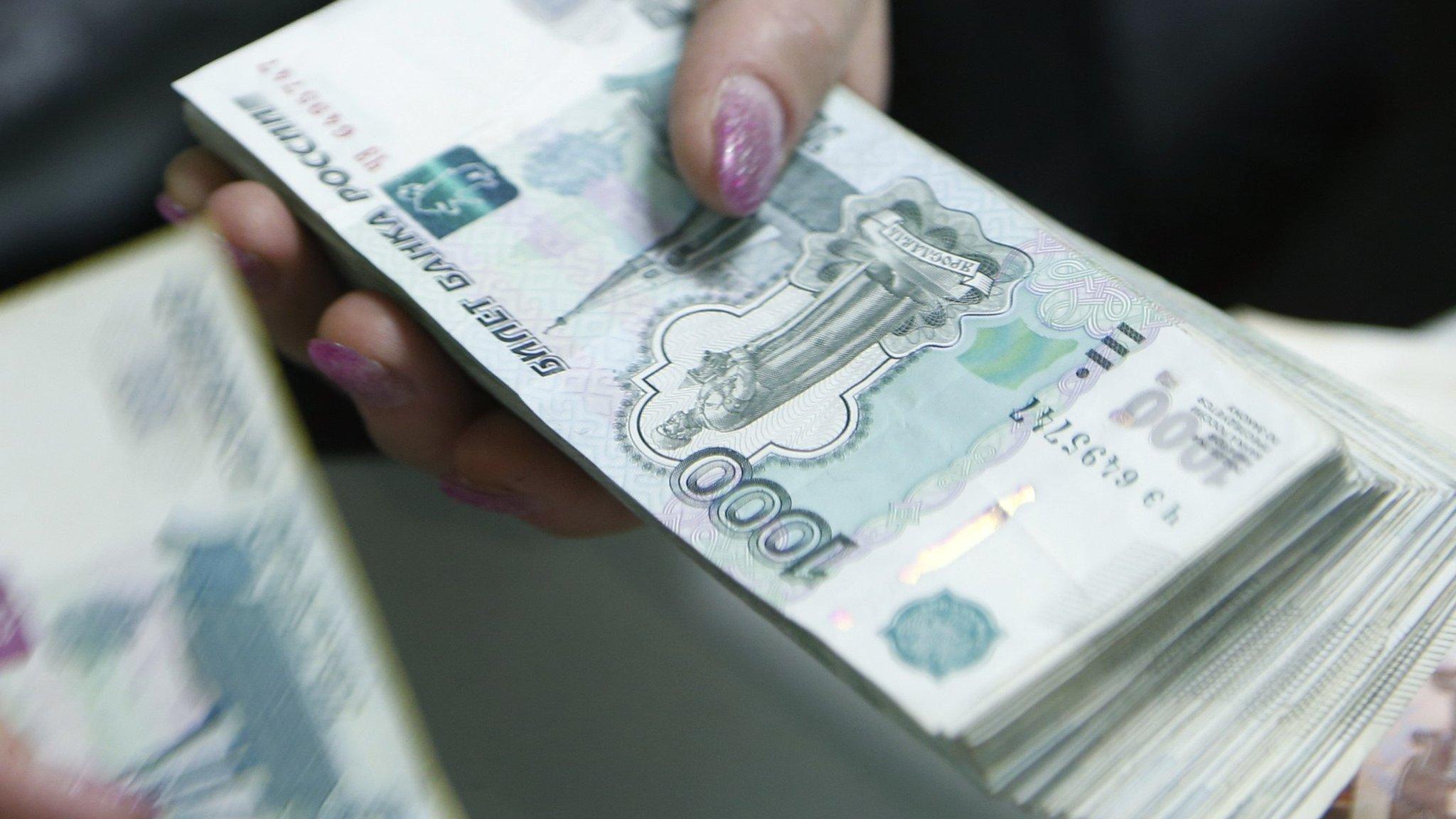
- Published17 October 2014
